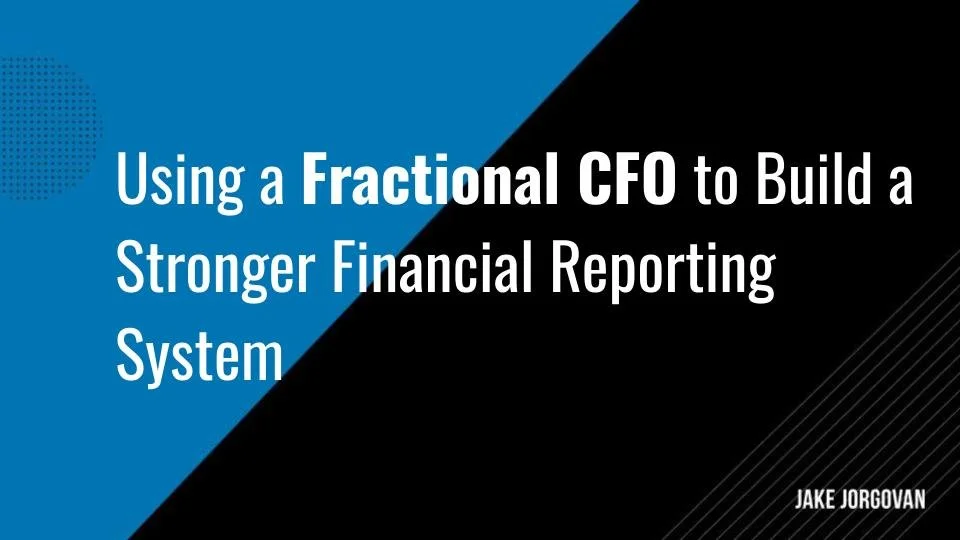How to Determine If Your Business Needs a Fractional CFO in 2025
A fractional CFO offers this expertise without the full-time commitment, tailoring leadership to fit both needs and budget.
This article pinpoints clear signs that your business might need such strategic financial guidance.
We'll explore:
Complex financial scenarios demanding expert oversight.
Overwhelming financial tasks diluting your executive focus.
Major upcoming financial events requiring meticulous preparation.
Let's decipher if your growing business could benefit from the nuanced insights of a Fractional CFO.
Understanding the Role of a Fractional CFO
Definition and Duties of a Fractional CFO
A Fractional CFO manages your financial strategy part-time. And they integrate seamlessly, offering top-tier financial expertise affordably. Basically, this role supports strategic decision-making without the overhead of a full-time executive. Therefore, your business gains flexibility in managing complex financial operations efficiently.
Fractional CFO focuses on several key duties:
They oversee your financial strategy, enhancing profitability and controlling costs.
They manage cash flow meticulously, ensuring your operations run smoothly.
They prepare for audits and regulatory compliance, maintaining high standards.
They advise on capital structure and funding opportunities, optimizing financial potential.
They develop financial forecasts and models, providing insights for informed decisions.
This tailored approach helps you tackle financial complexities with precision.
Comparison With Full-Time CFO and Accountants
Comparing a Fractional CFO with full-time CFOs and accountants clarifies their distinct roles:
Scope of Work: A fractional CFO strategically leads finance without the daily operational tasks, unlike a full-time CFO who is deeply integrated into all daily executive and strategic activities. Accountants handle day-to-day financial transactions and compliance, not strategic oversight.
Cost Implication: A Fractional CFO is a cost-effective solution, offering top-level financial expertise as needed, which reduces overhead costs significantly. Full-time CFOs demand a higher salary plus benefits due to their extensive role. Accountants generally have lower salary expectations but limited strategic input.
Expertise and Flexibility: Fractional CFOs bring specialized expertise tailored for critical growth phases or specific projects. This flexibility scales financial leadership up or down based on current needs. Full-time CFOs provide stability and continuity, which might be more than necessary for certain stages of business. Accountants focus mainly on compliance and record-keeping.
This structure lets you align financial leadership precisely with your business demands.
Key benefits of a Fractional CFO include:
Cost-effectiveness: You pay only for needed expertise.
Flexibility: Adjust the role as your business needs change.
Expertise on demand: Access top-tier skills when critical decisions arise.
Signs Your Business Could Benefit from a Fractional CFO
Growing Business Complexity
As your business expands, complexity multiplies. New products, markets, and staff demand expertise. You face intricate financial details daily.
That’s when strategic financial planning becomes necessary. A Fractional CFO navigates these challenges, ensuring stability.
Here’s how:
Strategic Financial Oversight: They oversee financial intricacies as you scale, ensuring decisions align with long-term objectives. Your focus remains on growth while they handle the complexities.
Expert Guidance on New Ventures: Introducing new products or entering new markets requires precise financial analysis and risk assessment. A Fractional CFO provides this expertise, tailoring strategies to ensure profitability.
Optimized Capital Allocation: They develop frameworks for efficient resource distribution, crucial during expansion. Investment in new technologies, markets, and personnel is managed to maximize returns.
Scalable Financial Structures: As your workforce grows, a Fractional CFO designs scalable financial processes to support increased activity without sacrificing oversight or control.
Customized Financial Modeling: They create financial models that reflect your changing business dynamics, aiding in forecasting and planning for future growth phases.
This targeted support ensures your expanding operations are underpinned by robust financial strategies.
Insider Tip:
Evaluate your financial operations regularly; identify areas where complexity overshadows clarity. Engage a Fractional CFO early when scaling into new territories or product lines. They'll craft financial strategies that not only support growth but also prevent overextension, preserving your capital and focusing your resources where they count most.
Financial Challenges and Overwhelm
As CEO, you might feel drowned in finances. Maintaining high-quality financial procedures can become challenging. This signals insufficient specialized financial leadership.
A Fractional CFO addresses financial overwhelm and procedural challenges effectively:
Strategic Delegation: They take on complex financial tasks, freeing you to focus on core business operations. This separation of duties prevents strategic oversight from becoming an afterthought.
Process Optimization: Your Fractional CFO streamlines and automates financial processes. They implement robust systems that enhance accuracy and efficiency, ensuring high-quality outcomes even under pressure.
Financial Health Monitoring: Regular assessments of financial health are conducted, spotting issues before they escalate. This proactive approach maintains your financial integrity.
Expert Financial Planning: They provide expert financial planning and analysis, helping to forecast and manage budgets more effectively. This ensures financial stability and supports informed decision-making.
Training and Development: A Fractional CFO can also train your team in best financial practices, elevating their ability to manage day-to-day financial tasks effectively.
Insider Tip:
Audit your financial task distribution monthly. Identify areas causing the most strain or errors. Prioritize these for your Fractional CFO’s focus, ensuring they direct their expertise where it impacts most significantly. This strategic alignment not only alleviates pressure but optimizes your entire financial operation for better performance.
Preparing for Significant Financial Events
Anticipating a capital raise demands precise planning and investor interest heightens the need for accuracy.
Still, all audits and compliance require meticulous preparation. Mergers and IPOs involve complex financial management, too.
These events strain your regular capabilities, suggesting you could use a Fractional CFO's involvement.
A Fractional CFO makes you more prepared to face crucial financial events because they tackle these points:
Capital Raise Preparation: They align your financial statements and projections to meet potential investors' scrutiny. This includes optimizing your financial narrative to clearly communicate potential ROI.
Audit and Compliance Mastery: Rigorous compliance and smooth audits are facilitated by their expertise in regulatory matters. They ensure all financial documents are accurate and up to standard, reducing audit risks and improving outcomes.
Merger and Acquisition Strategy: They evaluate and structure financial aspects of M&A activities, ensuring transactions are beneficial and seamlessly integrated. This includes due diligence and valuation to guide negotiations.
IPO Readiness: Preparing for an IPO involves complex financial structuring and rigorous compliance with financial reporting standards. Your Fractional CFO develops strategies that meet regulatory demands and appeal to public market investors.
Insider Tip:
Before major financial events, simulate potential scenarios with your Fractional CFO. This exercise sharpens your strategic responses and anticipates financial outcomes. You refine your approach based on these insights, ensuring you're fully prepared for any investor questions or regulatory scrutiny that comes your way during actual events.
Need for Improved Financial Systems
Your accounting processes must scale with your growth. Efficient, scalable systems prevent future financial bottlenecks.
That’s why implementing optimal financial reporting systems is crucial. These systems ensure accuracy and enhance decision-making.
A Fractional CFO can lead these upgrades, aligning your financial infrastructure with your expansion goals.
Here’s exactly how a Fractional CFO can elevate your financial systems effectively:
System Assessment and Redesign: They evaluate your current accounting processes, identifying inefficiencies. They redesign these systems to be more scalable, supporting your growth without sacrificing control or accuracy.
Technology Integration: Implement the latest financial technologies that streamline reporting and improve data accuracy. Your Fractional CFO oversees the integration, ensuring systems are robust and user-friendly.
Custom Financial Reporting: They develop tailored reporting frameworks that provide deeper insights into your financial health. This enables better decision-making and supports strategic planning.
Training and Support: Your team receives training on new systems and processes. This ensures everyone is competent and confident in using the upgraded tools.
Continuous Improvement: They monitor the performance of implemented systems, making adjustments as necessary to maintain optimal operation.
This strategic approach not only enhances current operations but also prepares your financial infrastructure for future demands.
Insider Tip:
Regularly review your financial technology stack with your Fractional CFO. Identify gaps in your current systems and forecast future needs. This proactive approach ensures you stay ahead of technological advancements and regulatory changes, keeping your financial operations streamlined and compliant as your business evolves.
Cash Flow and Budget Management
Struggling with cash flow management signals trouble because difficulty sticking to budgets impacts your overall stability.
Here’s the thing.
Managing financial discipline requires structured oversight. A Fractional CFO can restore control and precision. Let’s see how:
Cash Flow Optimization: They analyze your cash flow patterns to identify bottlenecks and opportunities. Tailored strategies are then implemented to improve liquidity and ensure operational funds are available when needed.
Budget Control: Your Fractional CFO sets realistic budgets aligned with strategic goals. They monitor adherence rigorously, ensuring deviations are corrected promptly. This discipline preserves financial health and supports growth.
Financial Forecasting: Advanced forecasting techniques predict future financial scenarios, allowing you to prepare and adjust strategies proactively. This insight helps in maintaining budget control and optimizing cash flow.
Cost Reduction: They identify inefficiencies and suggest cost reductions without compromising productivity or quality. These savings improve cash flow and financial flexibility.
Training and Policies: Implementing strong financial policies and training staff enhances financial discipline across your organization.
This comprehensive approach ensures you maintain a strong financial footing necessary to support ongoing and future business activities.
Insider Tip:
Schedule monthly cash flow reviews with your Fractional CFO. These sessions should focus on identifying emerging trends and unexpected variances. Adjust your strategies based on these insights to preempt financial pitfalls and align cash flow with your business’s operational needs and strategic goals. This keeps you agile and informed.
Making the Decision: Assessing Your Business Needs
Questions to Evaluate if Your Business Needs a Fractional CFO
1. Current financial pain points and areas needing expertise:
Identify Recurring Issues: Note frequent financial hurdles or bottlenecks.
Assess Expertise Gaps: Determine areas lacking in-house financial expertise.
Evaluate Impact: Consider how these issues affect overall business performance.
This process highlights specific needs that a Fractional CFO could address.
2. Financial projects and goals in the next 6-12 months:
Outline Upcoming Projects: List planned initiatives needing financial oversight.
Set Clear Goals: Define specific financial targets for each project.
Assess Resource Allocation: Determine if current resources meet these goals.
This ensures you understand the scope and requirements for financial leadership.
3. Realistic time commitment required from a CFO:
Evaluate Task Volume: List all CFO-level tasks.
Estimate Time Per Task: Allocate realistic time for each.
Consider Business Cycles: Adjust for peak financial periods.
This helps gauge whether a full-time or Fractional CFO is suitable.
4. Expected business growth and major financial initiatives:
Project Growth Rates: Estimate revenue and market expansion.
Identify Key Initiatives: List upcoming strategic financial projects.
Forecast Resource Needs: Determine financial resources required.
This evaluation helps decide the level of CFO involvement needed.
5. Budget considerations for CFO services:
Determine Financial Allocation: Assess available budget for executive roles.
Compare Service Costs: Evaluate costs of full-time versus Fractional CFO.
Analyze ROI: Estimate the return on investing in CFO expertise.
This approach ensures financial clarity in decision-making about CFO hiring.
6. Type of financial leadership and strategy guidance needed:
Identify Strategic Needs: Pinpoint specific strategic financial challenges.
Assess Complexity: Gauge the complexity of your financial landscape.
Evaluate Expertise Level: Determine the level of expertise required.
This assessment helps you understand the precise financial leadership your business requires.
7. Existing financial team capabilities and gaps:
Audit Skills and Expertise: Review each team member's skills.
Identify Deficiencies: Pinpoint specific areas lacking expertise.
Match Tasks with Skills: Ensure current roles align with abilities.
This structured approach highlights where a Fractional CFO could fill gaps.
8. Need for financial reporting, analysis, and forecasting:
Review Reporting Frequency: Check how often you need reports.
Assess Analytical Needs: Identify gaps in current analysis capabilities.
Forecasting Accuracy: Evaluate the precision of your financial forecasts.
These checks ensure your financial strategies are robust and future-ready.
9. Complexity of current financial operations and systems:
Map Out Processes: Diagram all financial workflows.
Evaluate System Integration: Check how well systems communicate.
Identify Bottlenecks: Find areas slowing down operations.
This assessment helps determine the sophistication needed in financial management.
10. Plans for fundraising, mergers, or acquisitions:
Detail Upcoming Initiatives: List specific upcoming financial activities.
Assess Preparation Level: Determine your current readiness for these events.
Evaluate Strategic Impact: Understand how these moves will shape your business.
This review clarifies the need for specialized financial guidance during critical transitions.
Maximizing Growth: The Strategic Value of a Fractional CFO
Now that you’re here, you have a good perspective of the clear signs and key indicators we've discussed—complex business scenarios, financial overwhelm, critical upcoming events, system inefficiencies, and cash management issues.
These are red flags suggesting your business may thrive with the strategic support of a Fractional CFO. Take this opportunity to rigorously assess your current financial operations and future aspirations.
Consider how a Fractional CFO could strategically align with your goals, offering not just savings on costs but also flexibility and specialized expertise exactly when required. This role is not just an expense but a solid investment in your business's scalability and sustainability.
So, leverage the strategic advantages a Fractional CFO brings to go through growth phases, financial complexities, and transitions with greater confidence and foresight.
Their expertise will be the cornerstone for thriving in a competitive business environment.

















